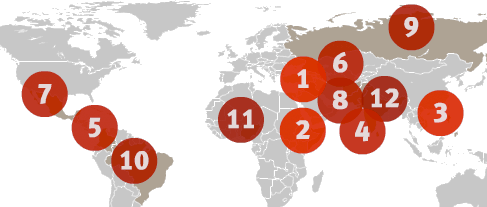The government of President Goodluck Jonathan used legal tools as well as brutal means to clamp down on media coverage deemed critical of the government. Sensitive and dangerous topics for the press included coverage of high-level public corruption, the government’s war against Boko Haram insurgents, and the political activities of the Jonathan administration. Regulatory agencies headed by Jonathan-appointed officials cracked down on radio commentary critical of the government, and banned a radio station in connection with its criticism of an official polio immunization campaign. Film regulators also banned an acclaimed documentary detailing a culture of impunity for public corruption. The administration criminally charged the independent newspaper Leadership over the publication of a memo allegedly written by the president on plans to increase gas prices and sabotage a merger of opposition political parties. Amid continuing military action against insurgents in the north, security forces also harassed a newspaper in connection with its investigative report on alleged extrajudicial detentions of terrorism suspects. The government amended the anti-terrorism law to include broadly defined offenses that criminalize some legitimate newsgathering activities, according to news reports. Nigeria appeared for the first time on CPJ’s Impunity Index, which highlights countries where journalists are murdered regularly and killers go free.
Nigeria
» Country ranks among worst for unsolved journalist murders.
» Government cracks down on information critical of the administration.
The government of President Goodluck Jonathan used legal tools as well as brutal means to clamp down on media coverage deemed critical of the government. Sensitive and dangerous topics for the press included coverage of high-level public corruption, the government’s war against Boko Haram insurgents, and the political activities of the Jonathan administration. Regulatory agencies headed by Jonathan-appointed officials cracked down on radio commentary critical of the government, and banned a radio station in connection with its criticism of an official polio immunization campaign. Film regulators also banned an acclaimed documentary detailing a culture of impunity for public corruption. The administration criminally charged the independent newspaper Leadership over the publication of a memo allegedly written by the president on plans to increase gas prices and sabotage a merger of opposition political parties. Amid continuing military action against insurgents in the north, security forces also harassed a newspaper in connection with its investigative report on alleged extrajudicial detentions of terrorism suspects. The government amended the anti-terrorism law to include broadly defined offenses that criminalize some legitimate newsgathering activities, according to news reports. Nigeria appeared for the first time on CPJ’s Impunity Index, which highlights countries where journalists are murdered regularly and killers go free.
-
8
Jonathan appointees -
US $14,000
Fine for government criticism -
20
Year jail term -
11th
Impunity Index ranking
Public institutions overseeing the nationwide dissemination, regulation, and licensing of broadcast, print, and film content were all headed by officials appointed by President Jonathan and served at his pleasure, according to CPJ research.
National Broadcasting Commission |
National Film and Video Censors Board |
Nigerian Press Council |
Ministry of Information |
Nigerian Television Authority |
Federal Radio Corporation of Nigeria |
News Agency of Nigeria |
Voice of Nigeria |
On April 4, the state-run National Broadcasting Commission (NBC) sanctioned Atar Communications, proprietor of Liberty FM, a station based in the northern city of Kaduna, citing an unspecified breach of Nigeria's broadcasting code, according to news reports.
The sanction was in retaliation for a March 18 talk program broadcast on the station that discussed public criticism of the "Good Governance Tour," a team led by Information Minister Labaran Maku that monitors progress and development around the country. Nigerian citizens had condemned the tour as a waste of time and money.
The radio station was fined US$14,000 for its offense.
Wazobia FM: | Banned |
Liberty FM: | Fined |
Radio Gotel: | Program suspended |
Adamawa Broadcasting Corporation: | Program suspended |
June amendments to Nigeria's 2011 Terrorism Prevention Act formally designated the hardline Islamist militant groups Jama'atu Ahlis Sunna Lidda'awati wal-Jihad, and Jama'atu Ansarul Muslimina Fi Biladis Sudan as terrorist groups, according to news reports.
The law--violations of which carry a 20-year jail term--outlined broad, poorly defined offenses that could be interpreted to conflate some activities of legitimate newsgathering with support of terrorism, according to CPJ research.
Section 4 (c): | "Attend[ing] a meeting, which in his knowledge is to support a proscribed organization or to further the objectives of a proscribed organization" |
Section 5 (2) (a): | "Incitement to commit a terrorist act through the Internet, or any electronic means or through the use of printed materials or through the dissemination of terrorist information." |
Section 5 (2) (c): | "Receipt or provision of information or moral assistance, including invitation to adhere to a terrorist or terrorist group." |
A steady rise in unsolved murders in recent years landed Nigeria on CPJ's Impunity Index for the first time. Nigeria trailed Somalia with the second worst impunity rating in Africa. The index calculates unsolved journalist murders as a percentage of each country's population.

| 1. Iraq 2. Somalia 3. Philippines | 4. Sri Lanka 5. Colombia 6. Afghanistan | 7. Mexico 8. Pakistan 9. Russia | 10. Brazil 11. Nigeria 12. India |
